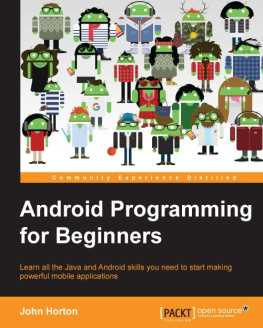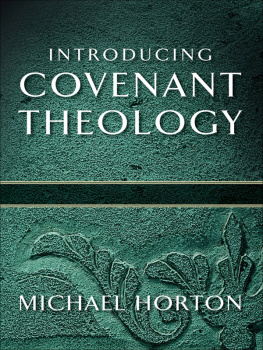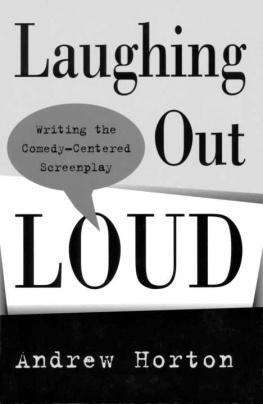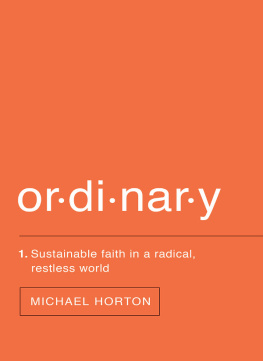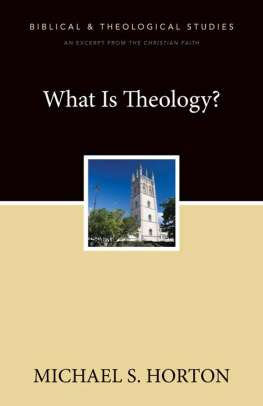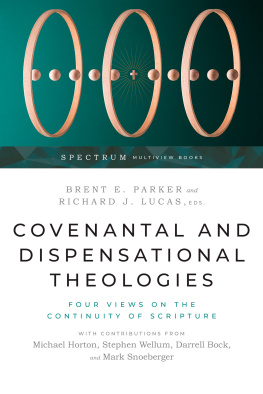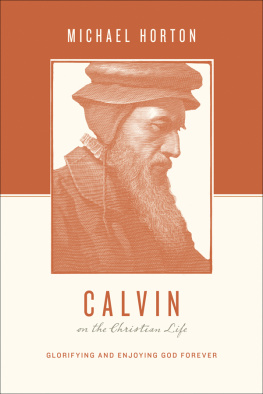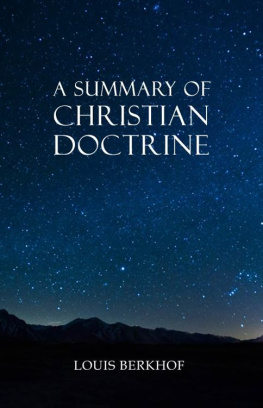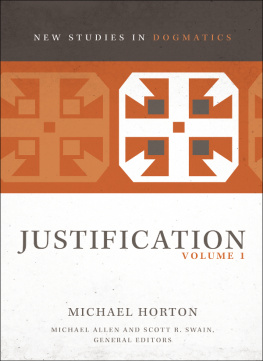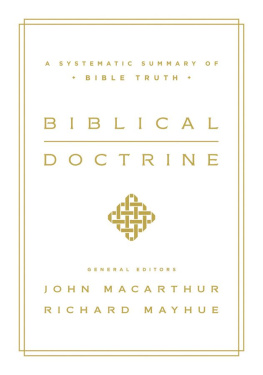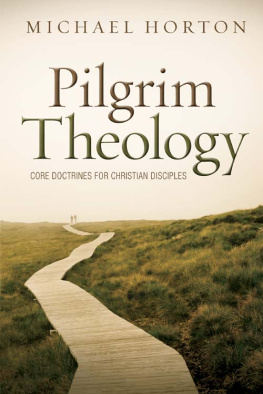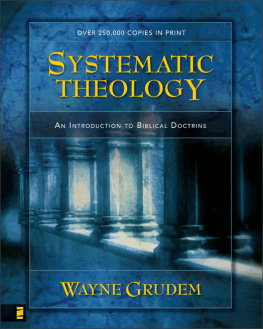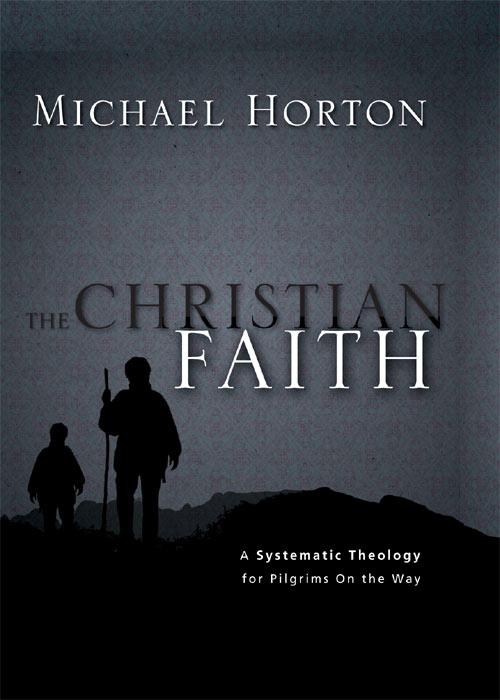M ICHAEL H ORTON
THE CHRISTIAN
FAITH
A Systematic Theology
for Pilgrims on the Way

| ANF | Ante-Nicene Fathers (ed. Alexander Roberts and James Donaldson; Grand Rapids: Eerdmans, repr. 1976) |
| BDAG | Walter Bauer, Frederick W. Danker, et al., A Greek-English Lexicon of the New Testament and Other Early Christian Literature (3rd ed.; Chicago: Univ. of Chicago Press, 2000) |
| BSac | Bibliotheca sacra Church Dogmatics Karl Barth, Church Dogmatics (ed. G. W. Bromiley and T. F. Torrance; trans. G. W. Bromiley; Edinburgh: T&T Clark, 19561975) |
| CO | Calvini opera, 59 volumes. In Corpus reformatorum (ed. C. G. Bretschneider, H. E. Bindseil, et al., vols. 2987; New York: Johnson, repr. 1964) |
| CTJ | Calvin Theological Journal |
| Elenctic Theology | Francis Turretin, Institutes of Elenctic Theology (ed. James T. Dennison Jr.; trans. George Musgrave Giger; Phillipsburg, N.J.: P&R, 1992) |
| HTR | Harvard Theological Review |
| Institutes | John Calvin, Institutes of the Christian Religion (ed. J. T. McNeill; trans. Ford Lewis Battles; Philadelphia: Westminster, 1960) |
| JAOS | Journal of the American Oriental Society |
| JETS | Journal of the Evangelical Theological Society |
| JR | Journal of Religion |
| LXX | Septuagint (Greek translation of the Old Testament) |
| m. Pesah | Mishnah, Pesah |
| NPNF1 | Nicene and Post-Nicene Fathers (ed. Philip Schaff et al.; 1st series; Grand Rapids: Eerdmans, repr. 1982) |
| NPNF2 | Nicene and Post-Nicene Fathers (ed. Philip Schaff et al.; 2nd series; Grand Rapids: Eerdmans, repr. 1982) |
| OS | Ioannis Calvini, Opera Selecta (ed. P. Barth and G. Niesel; 5 vols.; Munich: Kaiser, 19261936) |
| PG | Patrologia graeca (ed. J.-P Migne; 162 vols.; Paris, 18571886) |
| PL | Patrologia latina (ed. J.-P Migne; 217 vols.; Paris, 18441864) |
| PRRD | Richard Muller, Post-Reformation Reformed Dogmatics (2nd ed.; Grand Rapids: Baker, 2003) |
| SJT | Scottish Journal of Theology |
| SNTSMS | Society for New Testament Studies Monograph series |
| TDOT | Theological Dictionary of the Old Testament (ed. G. Johannes Botterweck and Helmer Ringgren; Grand Rapids: Eerdmans, 19742006) |
| ThTo | Theology Today |
| TT | Tracts and Treatises (trans. Henry Beveridge; 3 vols.; Grand Rapids: Baker, repr. 1958) |
| WBC | Word Biblical Commentary |
| WTJ | Westminster Theological Journal |
We believe in one God, the Father Almighty,
Maker of heaven and earth,
of all things visible and invisible.
And in one Lord Jesus Christ, the only-begotten Son of God,
begotten of his Father before all worlds,
God of God, Light of Light,
very God of very God,
begotten, not made, being of one substance with the Father;
by whom all things were made;
who for us and for our salvation
came down from heaven,
and was incarnate by the Holy Spirit of the virgin Mary,
and was made man;
and was crucified also for us under Pontius Pilate;
he suffered and was buried;
and the third day he rose again according to the Scriptures,
and ascended into heaven, and is seated at the right hand of the Father;
and he shall come again, with glory, to judge both the living and the dead;
whose kingdom shall have no end.
And we believe in the Holy Spirit, the Lord and giver of life,
who proceeds from the Father and the Son;
who with the Father and the Son together is worshiped and glorified;
who spoke by the prophets;
and we believe in one holy catholic and apostolic church;
we acknowledge one baptism for the remission of sins;
and we look for the resurrection of the dead,
and the life of the world to come. Amen.
The Nicene Creed, in Trinity Hymnal (rev. ed.: Philadelphia: Great Commission Publications, 1990), 846.
CONTENTS
I n 1949, the English playwright and novelist Dorothy Sayers observed the common antipathy in her day toward doctrine: Dull dogma, they call it. According to Sayers, however, Christianity is the most interesting story ever told. And the dogma is the drama. For many Christians, words such as doctrine and theologyand especially systematic theologyconjure up images of intellectual pride, divisiveness, and the presumption that we can put God in a box, neatly explained by our categories and formulations. Of course, we are nearly infinitely resourceful in using good things with corrupt motives and for less than noble ends. We can exhibit spiritual pride also in our experience or morality. However, it is the goal of good theology to humble us before the triune God of majesty and grace. As we will see more fully, the older theologians of the Reformation and Post-Reformation eras were so convinced that their interpretations fell far short of the majesty of God that they called their summaries and systems our humble theology and a theology for pilgrims on the way.
I. W HY T HEOLOGY ? D RAMA , D OCTRINE , D OXOLOGY, AND D ISCIPLESHIP
Theology simply means the study of God, and doctrine means teaching. Since the main message of Scripture is the unfolding mystery of Christ, who reveals his Father and reconciles us to him, theology is a central concern of every believer. It would be odd if we told our spouse or other loved ones that we wanted to spend time with them and experience their fellowship regularly but did not want to know anything about themtheir characteristics, accomplishments, personal histories, likes and dislikes, and plans for the future.
Yet when it comes to God, people often imagine that it is possible to have a personal relationship with God apart from theology. In fact, some Christ ians assume that knowing doctrine and practical living are competing interests. The modern dichotomy between doctrine and life, theology and discipleship, knowing and doing, theory and practice has had disastrous consequences in the life of the church and its witness in the world. I hope to change some readers minds about systematic theology and its relevance by first changing our working assumptions about its nature, goals, and methods.
A. D RAMA : T HE G REATEST S TORY E VER T OLD
A modern myth is that we outgrow stories. When someone asks us to explain who we are, we tell a story. Furthermore, we interpret our personal narratives as part of a larger plot. Who are we? Why are we here? Where are we going? Whats the point? Is there a God and if so can we know him? Why is there evil in the world? The biggest questions, demanding the most rigorous intellectual analysis, are really doctrines that arise from a particular story that we either assume or embrace with explicit conviction. The Christian answers these big questions by rehearsing the story of the triune God in creation, the fall of the creatures he made in his own image, the promise of a redeemer through Israel, and the fulfillment of all types and shadows in the incarnation, life, death, resurrection, ascension, and return of Jesus Christ. The Apostles and Nicene creeds are not just a list of key doctrines; they are a confession in the form of a story, our shared testimony to the most significant facts of reality.


